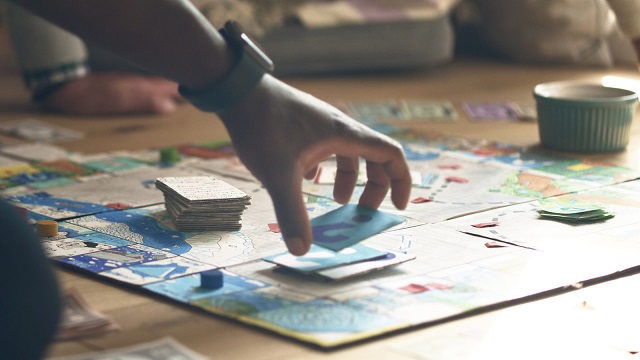
Cooperative board games, sometimes referred to as “co-op” style games, have become increasingly popular in recent years. Part of the reason for their popularity is the fact that cooperative board games can be enjoyed by people of all ages and backgrounds, making them an ideal choice for family game nights or other social gatherings.
They can also provide physical and mental benefits for players, as well as teach valuable lessons about collaboration and communication. By taking a closer look at why cooperative board games are so popular and what kind of impact they can have on individuals who play them, it is easy to see why they continue growing in popularity.
One of the great things about cooperative board games is that they allow for hours of fun without relying on competition between players. Instead, everyone works together towards a common goal and celebrates when the mission is fulfilled.
This helps foster positive relationships between participants since they are less likely to become discouraged with failure or let jealousy stress interfere with their enjoyment of the game. Additionally, because these sorts of games require strong communication skills in order to succeed, they may indirectly help young people learn more effective ways to express themselves and work with others in everyday life situations outside the game itself.
Furthermore, one report found that playing cooperative board games can even lead to an increase in cognitive flexibility among participants. This type of thinking bridges abstract problem solving with concrete tasks which leads to increased performance on standard cognitive tests by up to 11%. It’s no wonder that this type of gaming has been suggested as a way for kids (and adults) not just to entertain themselves but also improve their critical thinking skills at the same time.
All these factors considered, it’s clear why so many people have turned towards cooperative boardgames instead of traditional competitive ones – their entertaining yet educational nature make them truly unique experiences for players looking for something new (or old.) under the gaming sun. Whether its helping kids strengthen relationships with those around them or introducing adults to newfound strategies and methods solving problems, there endless reasons why co-op style gaming should remain popular long into the future.
Historical Overview of Cooperative Board Games
The concept of a cooperative board game was first introduced in the 1970s, when Reiner Knizia created ‘Lost Cities’ – one of the first cooperative games where players work together to find a lost city. It quickly gained popularity with gamers due to its collaborative aspect and ease of play. Since then, cooperative board games have grown in popularity as an accessible form of entertainment for fans of tabletop gaming.
Cooperative Board Games vs Competitive Board Games
The biggest difference between cooperative board games and competitive ones is that in cooperative board games, all players are working together towards a common goal. This can be anywhere from rescuing hostages from a crumbling building to defeating a fictional dragon. All thanks must be shared as everyone works together to complete the task.
On the other hand, competitive board games have goals specifically designed for each player to compete against their opponents. These objectives range from collecting the most points or tokens to getting past all your opponent’s pieces on the board.
Expressing Creative Talent in Cooperative Board Games
One advantage of playing these types of games is that they give people an opportunity to express their creative talents through collaboration and cooperation with others. With the help of advanced game pieces, artwork, and storytelling elements cooperative board games allow individuals to craft complex stories using shared resources that each contribute something inventive or unique to completing an objective or challenge at hand.
They also come with ready-made backstories or themes which create greater opportunities for developing team dynamics within their own creative story lines over time during gameplay sessions compared to traditional competitive gaming varieties.
Popular Cooperative Board Games
The concept of cooperative board games was created to promote socialization and camaraderie among players, rather than the competitive mindset more typically associated with traditional board games. This has become increasingly popular in recent years, as more game designers are finding innovative ways to make cooperation fun and engaging. There is now a huge selection of cooperative board games, each offering unique components that appeal to different types of players.
Pandemic
Pandemic is one of the most popular cooperative board games on the market. In the game, players work together to save humankind from a global pandemic epidemic.
Players take on different specialist roles – research scientists, medics, leaders and epidemiologists – to find cures for different diseases spread throughout the world while managing their limited resources. The layout of the game causes realistic scenarios that require players to collaborate closely if they hope to be successful in their mission in this challenging yet thrilling adventure.
The Lord of The Rings: Journeys in Middle-earth
The Lord of The Rings: Journeys in Middle-earth creates an immersive gaming experience and puts its players on various quests against perilous threats. Each player starts with a pre-made hero from Tolkien’s books and embarks on an epic journey around Middle-earth as part of a Fellowship aimed at thwarting Sauron’s sinister forces.
Though cooperation is always paramount, individual choice serves as the backbone; it provides each player with an opportunity to make decisions which impact both themselves and their teammates, fostering trust between them during their heroic quest.
Betrayal at House on the Hill
Betrayal at House on The Hill is a spooky adventure through an eerie mansion filled with unforeseen twists and turns throughout the game. Each player takes up roles such as madmen or cultists who explore various rooms within the house until one discovers its mysteries or perishes trying. However, deception ensues when one character ultimately betrays his accomplices after randomly drawing a traitor card – thus forcing them into complete chaos where survival depends solely upon mutual trust amongst friends.
Variety of Cooperative Board Game Mechanics
Cooperative board games are gaining popularity as more people recognize their potential to build social connections and promote team work. Cooperation facilitates problem-solving strategies while building a sense of community and fun. Such board games can be categorized into four different mechanics:
- Auction or bidding
- Set-collection
- Resource management
- Tile-laying
Each of these game mechanics offers different experiences, varying in complexity and reliance on strategy.
Auction or Bidding Mechanics
In an auction or bidding mechanic, players use currencies such as coins, resources, or parts to bid for certain game pieces with the aim of achieving the highest score by the end of the round. For instance, in `The Prodigals Club` players compete with each other to buy cards from 12 unique sets that represent elements of fashion design.
The goal is to acquire the collections with the most fashionable designs and present them to an audience who evaluates your style and gives you points accordingly.
Set-Collection Mechanics
In a set-collection mechanic, players try to match themed categories usually requiring strategic planning throughout their gameplay. Players need to hoarde resources necessary for completing sets while maintaining logic considering their competition’s behavior and adjacent resources available on the board.
In `Altiplano`, players compete with each other by trying to manage resources like wool, salt, food, stone by adding goods cards together in order complete full rounds without overfilling their bag; so they’re able optimize gains whilst avoiding penalties for overstuffing it afterwards.
Resource Management Mechanics
Resource management games have deep economic themes with plenty of waves in which risk/reward decisions arise because a player must decide how much prior investment is needed at a given point in time so they can gain as many victory points as possible later down the line.
Moreover these types of cooperative activities usually require understanding complex rules related to how certain elements interact within certain contexts reinforcing good decision making abilities related to scarce resource allocation Similarly ‘Noria` requires players to build up liquid assets within factories while managing prices simultaneously similar t e yo allocating real life financial resources in physical markets.
Tile Laying Mechanic
Different Genres of Cooperative Board Games
Co-op board games provide a fun way for families and friends to come together and test their teamwork skills. Usually, in this type of game, players join forces to fight against a mutual opponent or scenario; working together as a team to win the game. There are several genres of cooperative board games, from fantasy-themed games such as Dungeons & Dragons or Elder Sign, to sci-fi themed games such as Space Alert or Galaxy Trucker.
Adventure Games
One popular type of cooperative board game is the adventure genre. In these types of games, players are typically thrown into a specific scenario where they must work together in order to reach a certain goal by the end of the game. Adventure games typically require strategy, problem-solving and teamwork in order for players to succeed in their quest. Some examples of these types of cooperative adventure games include Pandemic Legacy and Zombicide: Black Plague.
Party Games
Party board games also fall under the co-operative category, but are generally less intense than adventure style board games. Party style board games rely more on luck than strategy and problem solving like adventure games do; however, they still require teamwork in order for players to win the game. Examples of party co-op boardgames include Codenames and Clue: The Classic Mystery Game.
Economic Simulation Games
Economic simulation co-op boardgames are an exciting blend of resource management and cooperation between players. These types of cooperative boardgames focus on managing resources, investments and budgets all while keeping a mental balance between negative cost outcomes vs beneficial gain opportunities that will contribute towards overall success in achieving goals set out within the context of the game’s theme or storyline. Popular economic simulus co-op boardgmaes include Suburbia Inc., Agricola Revisited Edition and Archipelago: Empires Edition.
Benefits of Cooperative Board Games
Cooperative Board Games are a great way to enjoy a fun and satisfying gaming experience with family members, friends or even new acquaintances. It’s not uncommon for people to meet through cooperative board games since they provide an opportunity to learn more about each other in an environment that is both entertaining and safe.
Not only do cooperative board games offer social connections, but they also promote cognitive stimulation. Players must use critical thinking skills and work together as a team in order to strategize their way to victory. These type of games require players to actively participate in problem solving, come up with creative solutions, weigh risks and rewards, utilize communication and coordination skills.
A Brief List of the Benefits of Cooperative Board Games Include
- Promote person-to-person interactions
- Get people talking with one another
- Encourages team work and collaboration
- Develops problem solving skills
- Teaches strategic thinking
- Develops flexibility in decision-making.
Learning how to cooperate with others is a skill that will serve players throughout their lives. In addition, playing cooperative board games can help build personal confidence while deepening relationships and providing much needed mental stimulation. With so many options ranging from simple puzzles to complex adventure games, there is sure to be something for everyone.
The Basics of Hosting a Cooperative Board Game Party
Cooperative board games have become increasingly popular in recent years, providing an entertaining and interactive way to spend time with family and friends. Hosting a cooperative board game party can be loads of fun filled with excitable conversations, challenging puzzles, and plenty of laughter.
The Game Choices
When planning a cooperative board game party, it is important to pick the right games. Take into account the ages and experiences of your guests when making game choices. Certain variations or expansions of existing board games may also challenge experienced players while still accommodating beginners.
Consider different types of cooperative board games, such as deduction-based mysteries like Codenames or adventure exploration-type games like Forbidden Island. If you are hosting more than one party, then make sure to come up with new gaming options each time to keep things interesting for your guests.
Party Set Up & Preparation
For your party preparations and setup, designate a central game area where all players can easily congregate and participate together. This will depend on the size of your group and the number of games that you plan on playing. Clear out a large space around the table (or several tables) so everyone has room to move their arms freely without knocking over any pieces or spilling any beverages.
Alternatively, if you are having an outdoor event, select sturdy and comfortable chairs for your guests to sit on with enough space between each so they are not too close together or cramped in-between people/objects.
Make sure that all materials needed for each can be reachable within every player’s reach; deck boards for card-focused games should have room behind them as well so they do not have to be held up while being played by 2-4 players simultaneously.
Keeping Everyone Engaged
During a cooperative board game party it is important that everyone remains engaged throughout the night in order to experience maximum enjoyment out of their gaming experience together. Encourage engagement verbally from time to time throughout the game by posing questions or challenges-this will not only keep everyone involved but will also help refresh players’ minds while they find solutions together at certain points during particular gameplay moments.
Additionally, remind your guests every once in awhile about what direction they must focus towards in order to complete objectives; this keeps them continuously re-engage their concentration alertness rather than musing off mid-gameplay thought after long moments filled with discussions without concluding anything properly in between gameplayers’ shifts throughout turns/rounds etcetera.
Wrapping Up
Coooperative board games are an exciting and unique form of entertainment that allows players to work together as a team towards the common goal of winning the game. They’re an ideal choice for family game night, or just getting together with friends on a rainy day. As an added bonus, cooperative board games will hone your problem-solving skills and strategic thinking.
When playing cooperative board games, it’s important to remember that you won’t be competing against each other – the focus is on working together as a single unit to beat the game. This requires players to effectively communicate their ideas, come up with strategies and take turns making decisions.
When playing cooperatively, it’s best to keep everyone involved in the process, so make sure you each get a chance to weigh in on decisions. This way, no one is stuck sitting along waiting for their turn while everyone else decides how to proceed.
Cooperative board games are also great for teaching children valuable social skills such as cooperation, communication and teamwork. Kids can learn how small actions can influence the whole group while they work together to solve puzzles or conquer different scenarios. It can also be used as an effective way for parents to bond with their children by engaging them in something fun they can do together.
In addition to increasing problem-solving skills and strengthening social bonds, cooperative board games have been shown time and again to be incredibly enjoyable experiences for the participants involved. The sense of accomplishment after completing a challenging game is one that’s increase with positive feedback from others – even more so if celebratespecial treats are offered upon completion.
To top it off, these sorts of events are not only memorable but help to create lifelong memories of bonding between people close in life whether they be family members or friends. So if your usual go-to movie nights begin leaving your gang unimpressed then why not give cooperative board games a shot?




